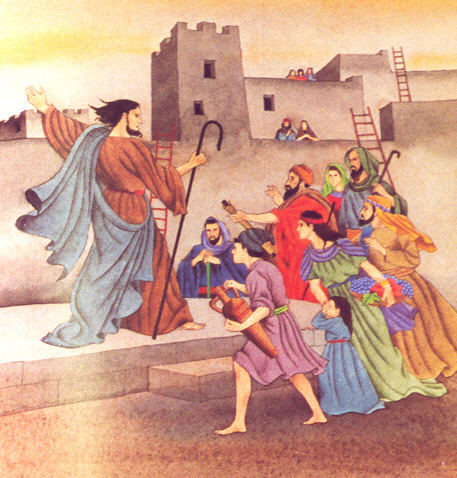
Return to
Index The Catholic Faith
Return
to Level One Topic Index
Home Page
When we hear the word "prophet," we usually think of someone who predicts the future. But foretelling the future was a small part of the Old Testament prophets' role. Their job was much more important than that. God called the prophets to keep the people of Israel from becoming just like other nations and to keep them mindful of their covenant with God.

How could that happen? Very simply. After the death of Solomon, the Hebrews were split in two. Some followed the successor of David, the others followed a different ruler. Both groups began forgetting about God and the commandments. Soon, they were worshipping false gods. Instead of remaining true to God after all he had done to make them a great nation, the Hebrews wanted to "be like everyone else." All the other tribes had gods of wood and stone, and the Hebrews did not want to be different. (That may sound silly, but all of us have at times done foolish things because we did not want to be different from our friends!) Before long, there was hardly any difference between the Hebrews and the pagan nations. Hebrews would even marry pagans. Without the faith and law that kept them a separate people from the world, the chosen people would simply blend in with other tribes until they no longer existed as a nation.
God kept this from happening by sending the prophets. The prophets reminded the people that they had broken their promises to God. he called on them to repent and change their lives. As you can imagine, the prophets were not always very popular. The Hebrews did not want to be told they were doing wrong. But when the Hebrews were defeated in war and taken into captivity, they realized they were being punished for their sins. They repented.
Isaiah
During
the last centuries before the birth of Christ, the prophets also had to prepare
the people for the coming of the Savior. Isaiah was one of those who made
prophecies about the coming Messiah. He predicted that the Savior would be
born of a virgin. He made it clear that he would be more than another
earthly ruler:
His name shall be called Wonderful, Counselor, the Mighty God,
the Everlasting Father, the Prince of Peace. (Is 9:5-6).
The Jewish people were expecting a triumphant leader who would restore the kingdom of Israel. They must have been surprised when Isaiah spoke of the Savior's mission as one of pain and humiliation.
He was despised and rejected by men; a man of sorrows
and acquainted with grief; and as one from whom men
hide their faces he was despised, and we esteemed him
not. Surely he has borne our griefs and carried our
sorrows; yet we esteemed him stricken, smitten by God,
and afflicted. But he was wounded for our transgressions,
he was bruised for our iniquities; upon him was the
chastisement that made us whole, and with his stripes we
were healed. (Is 53:3-5).
Jeremiah
The prophet Jeremiah came after Isaiah, at a time when the people had again fallen into idol worship. Jeremiah had to speak out against this and call the people to repentance. He had to oppose the sinful actions of the king of Israel. Because of this, Jeremiah suffered arrest and imprisonment on several occasions. Jeremiah predicted that the people would be punished for their sins, and it came to pass. There was famine, war, and finally captivity under the king of Babylon. During the captivity other prophets consoled the people with prophecies of the promised Messiah.
Other prophets followed Jeremiah. The last and greatest of the prophets began his mission, not before, but after the birth of Jesus. His name was Saint John the Baptist.
Used with the permission of The Ignatius Press 800-799-5534
Return to Index The Catholic Faith
Return
to Level One Topic Index
Top
Home Page